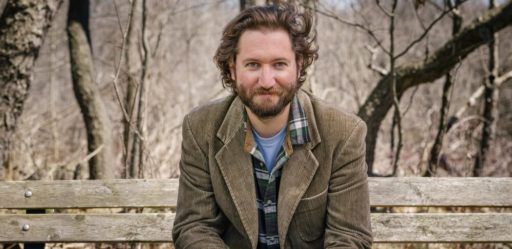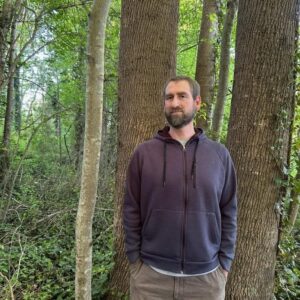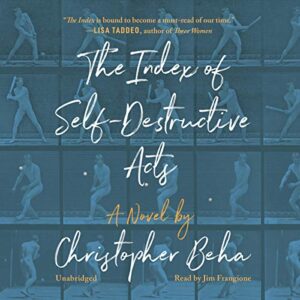We recently spoke with author Jonathan Geltner about his new Slant book, Absolute Music.
This is your debut novel. What was the journey like that brought you to this moment?
More than anything else Absolute Music comes from my experience of becoming a father. When my wife was pregnant with our older son, shortly before I started work on the novel, my boyhood and youth began coming back to me. My boyhood was full of romance, wonder, fantasy, and it was out of doors. When I started to recall that time, I wondered how it would be for my sons.
The earth is dying in a way that it was not (or we did not know it fully) when I was a boy, a way that is different from what is meant when we acknowledge that this world is always, as the Bible puts it, “passing away.” And this fact changes everything. Yet the earth is beautiful and will remain so. How can I show my children this goodness despite what threatens it? Which intellectual, artistic, and religious traditions that I possess are still quick and true, and which no longer avail in this father’s task? That was my question that the novel came out of—and it’s still my question.
Absolute Music feels like a love letter to the Midwest, with loving descriptions of Cincinnati, Pittsburgh, and other places. What role does landscape and place play in your writing?
For me, the sense of place and the sense of the sacred are inextricably linked.
Some years ago my wife and I were passing through Pittsburgh and we stopped at a brewpub located in a former Catholic church that had been dedicated to John the Baptist. The brew tanks are where the altar once was. (I find that oddly fitting.) The server assured us the place had been duly deconsecrated, and even as I sipped the beer—which was pretty good—I wondered what it meant that we think something like that lies in our power. And I began to wonder if we also need places that we discover are sacred, not that we make sacred by our own action. Because whatever can be consecrated can be deconsecrated—or desecrated.
R.H. Blyth, the great expositor of Zen, said this about the holiness of the world, which is the one “place” we most need to discover is holy:
“At first we think certain things or places or persons are holy. Then we understand that this is superstition, and know that they are not holy. Finally we realize that all things are holy, and some things especially.”
I think good writing comes from that third stage, or at least from the quest to arrive there.
A related question pertains to our planet’s ecological problems, which preoccupy the novel’s protagonist, McPhail. Was it difficult to include such a politically charged subject into a work of fiction?
It would have been more difficult—impossible, really—not to include it. Trickier subjects to include in the novel were those pertaining to religious and ethnic identity. But those are of a different category than the ecological crisis. Unless that crisis is met, we will not much longer have the luxury of arguing over religious and political differences.
Your protagonist, McPhail, is a struggling fantasy novelist. Fantasy as a genre is now huge and beloved around the world but in literary circles it is often looked down upon. What does the genre mean to you?
Fantasy defined my childhood to such an extent that I went on to study medieval literature and philology in order to read the sources of modern fantasy in their original languages. My dissertation was going to look at the medieval origins of fantasy and at the modern genre. But I was encouraged to drop the parts on modern fantasy. Indeed, the genre doesn’t have clout in literary or academic circles. One of the reasons, I think, is that because fantasy trades in the symbolic and even the sacramental, it is close to religion. Go into a beautiful, older church, ideally right after a liturgy has been celebrated, and look at the imagery and art, note the architecture, the light, the scents: it’s like walking into a fantasy novel, even if you know and care nothing about what you’re seeing and sensing.
Fantasy is like the shadow or imitation of (perhaps also the preparation for) religious experience, which is in part the experience of a created, living cosmos. A lot of Western religious faith and metaphysics went to hide out in fantasy, beginning in the nineteenth century, and that’s often still where we have to go in search of those treasures.
That said, more broadly there are two ways to speak of fantasy, one negative and one affirmative. To use the word in its negative connotation, I would say one of the purposes of fiction is to help us discern the difference between fantasy and reality—something which the profusion of virtuality in various forms has made much more difficult. Virtuality is often a vehicle and catalyst of the bad kind of fantasy: the denial of embodied reality, of nature.
But the good kind of fantasy…let me just say I read all that fantasy as a kid outdoors as much as possible. I still think of reading as ideally an outdoor activity. Anyhow it’s something that ought to weave you into the world, not turn you inward. Maybe that’s one criterion for distinguishing between good and bad fantasy: does it embed you in the world or divide you from it? Does it join heaven and earth or pit them against each other?
McPhail possesses what he calls an “obsolete consciousness.” You’ve also said this narrative is his attempt to “re-enchant the world.” What does that mean?
Re-enchantment can be an annoying word—like fantasy—because it can sound trite, twee, silly. But it’s serious business. You can’t live in an enchanted cosmos that is all splendid and conducive to what we now call “wellness.” At my church and at many Catholic churches we still conclude Mass with the old prayer to the Archangel Michael, a prayer for protection against “Satan and all evil spirits who wander through the world seeking the ruin of souls.” Anyone who signs on for an enchanted cosmos is signing on for some version of that.
But ultimately enchantment is good, because it means that all things which truly have being are created by God. One thing which does not, I think, truly have being but is a simulacrum of being, is the virtual realm. I think virtuality is—or at least is liable to be—the enemy of enchantment. The antonym of cosmos is not chaos (a degree of which is necessary to keep cosmos vital and supple), it is metaverse.
The novel conceives of music in several ways, not just in the traditional sense. There is the music of poetry, of language itself, and the book is divided into “Suites.” Tell us more about the centrality of music in the story.
At least in the Western tradition, a musical tone was thought of as occupying a place, and you can see that still in the way we write music, which is like a chart or map of tones. A tone is a kind of place, it is material, spatial, mathematical. Flip that around and think of the places of the cosmos making different tones that combine in a great music. That’s the medieval view, the music of the spheres—the music that McPhail (who writes his “book behind the book” in music composition notebooks) desperately wants to hear.
McPhail, like you, is a well-educated guy, constantly riffing on artists and thinkers, past and present. Is Absolute Music a “novel of ideas” and if so, did you find it challenging to ground the ideas in characters and images that feel rooted in reality?
I’d say there are passages in it that are reminiscent of the classic novel of ideas, if I’m thinking of that as something other than a straight-up realist novel. And there are ideas baked into its structure: its models are Bach’s Cello Suites and the Elizabethan poet Edmund Spenser’s epic romance, The Faerie Queene.
But I would boldly go on from there and insist that real ideas—as distinct from mere thoughts and speculations—must incarnate, they must live in things, in places and in people. I’m with Eriugena, the medieval philosopher whose work is quoted in Absolute Music. For him, all of creation—the given, natural world—is theophany, revelation of God. Therefore, attend to the creation.
Jonathan Geltner studied English, Classics, and French at the University of Cincinnati, pursued graduate work in English at the University of Chicago, and earned an MFA in fiction from Warren Wilson College. He published a translation of Paul Claudel’s Five Great Odes with Angelico Press in 2020. Absolute Music is his first novel. Jonathan is an avid cyclist and student of Tai Chi, as well as an amateur philologist with a penchant for Irish, Hawaiian, Hebrew, and Classical Chinese. He lives in southeastern Michigan with his wife and two sons.





